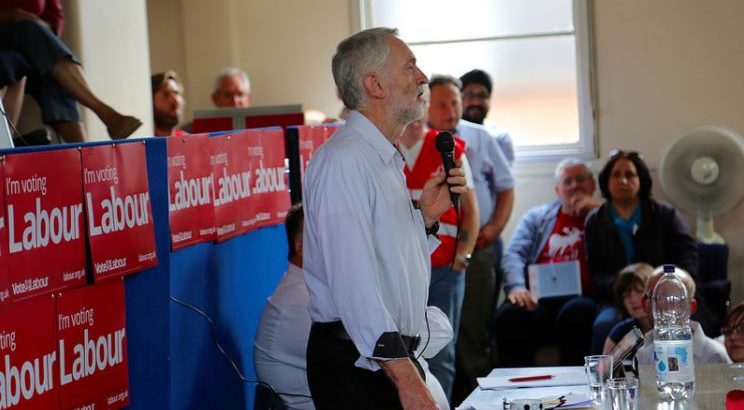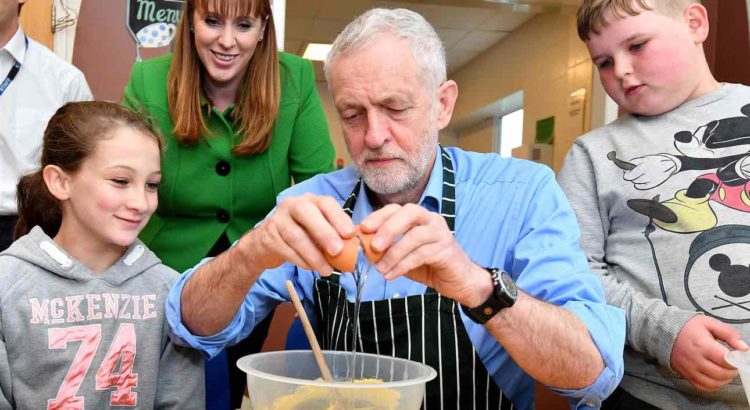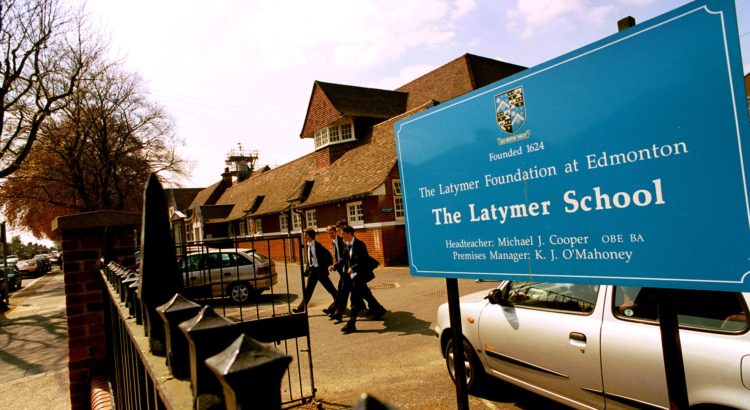El Partido Laborista nunca ha sido un partido socialista, pero siempre ha tenido socialistas, y por primera vez están en el asiento del conductor. Esto se ha reflejado en el manifiesto-programa del partido de 2017. Con el título “For the Many, Not the Few” (Para la Mayoría, No la Minoría)*, representa el máximo logro del corbynismo hasta la fecha y ofrece al pueblo británico la primera oportunidad en una generación de votar por políticas que significarían un cambio fundamental hacia la izquierda.
Aunque moderadas en el lenguaje, las propuestas programáticas son radicales; basándose en las promesas de las dos campañas de primarias de Jeremy Corbyn, sostiene una visión que pondría fin a la era de la austeridad y daría forma a un nuevo marco económico, que acercaría la riqueza y el poder del capital a los trabajadores.
Todo indica que este programa es extremadamente popular. La semana en la que se lanzó el manifiesto completo de 128 páginas, se convirtió en viral en la red, compartido decenas de miles de veces. Fue mucho mejor recibido que el equivalente conservador y ha catapultado al Partido Laborista en algunas encuestas a cinco puntos del partido gobernante. Después de dieciocho meses de dificultades, el trabajo de Corbyn ha encontrado terreno firme por primera vez. Pero, ¿qué propone el manifiesto y cómo puede realizarse su propuesta?
La promesa
El manifiesto tiene tres ejes fundamentales: nacionalizar las principales empresas de servicios públicos cuya privatización ha aumentado el coste de la vida; reformar las condiciones laborales, deteniendo el proceso de degradación en términos y condiciones; y construir una economía social en la que los elementos básicos necesarios para vivir una vida digna – desde la educación y la vivienda hasta la asistencia social y las ayudas sociales – mejoren y, en muchos casos, sean de libre acceso.
El Partido Laborista propone revertir en propiedad pública no sólo el ferrocarril sino también el servicio postal, la energía y el suministro de agua. Aumentaría el salario mínimo a diez libras por hora, aboliría los contratos de cero horas, prohibiría las prácticas no remunerados, otorgaría a la gente autónoma los mismos derechos que a las personas empleadas y otorgaría a los sindicato el derecho de acceder a los centros de trabajo.
Bajo el gobierno laborista se construirían un millón de viviendas, la mitad de ellas de propiedad pública. Se introducirían controles de alquiler. Los gastos de matrícula de las universidades serían desechados, habría guardería gratis a partir los dos años, comedores escolares gratuitos durante la etapa de primaria y un servicio de educación nacional que invertiría 6 300 millones de libras en mejorar las escuelas. El Servicio Nacional de Salud sería renacionalizado, eliminando los servicios privatizados, y los hospitales ya no cobrarían por el aparcamiento de coches. Las personas mayores tendrían garantizada la pensión y se invertirían dos mil millones de libras en atención social. Se invertirían los recortes en bienestar.
Para lograr este programa de transformación social, el manifiesto vuelve al viejo principio de la tradición laboralista y socialdemócrata: la redistribución de la riqueza. Los 52 500 millones de libras esterlinas necesarios para financiarlo vendrían de los impuestos sobre las empresas y de quienes ganan más de 80 000 libras al año, así como de propuestas como una campaña contra la evasión fiscal y el fraude, el impuesto Robin Hood sobre las instituciones financieras y un impuesto sobre las tasas de la escuela privada. La gran mayoría de la gente británica se beneficiaría de un programa pagado por el 5 % que más gana. De la minoría para la mayoría.
A diferencia de los manifiestos de otras campañas en las últimas décadas, «Para la Mayoría, No la Minoría» es un giro a la izquierda en las propuestas del partido. En los dos años transcurridos desde las últimas elecciones, la política laborista ha avanzado desde el objetivo de suavizar los efectos del neoliberalismo, a querer reformarlo y, ahora, a derrotarlo. Si Ed Miliband se comprometió a limitar los precios de la energía (una política denunciada como marxista en aquel momento), Corbyn se compromete a intervenir directamente en el mercado de energía a través de la creación de empresas energéticas controladas regionalmente, junto con la renacionalización del National Grid (la red nacional). Hace dos años, Miliband y Balls trataron de acabar con los contratos de cero horas que eran «injustos». Hoy, Corbyn y McDonnell buscan su completa abolición. El Labour entró en la elección general de 2015 prometiendo reducir las tasas de matrícula para la universidad, pero ahora están comprometidos con la educación superior gratuita.
Si el Brexit apareció como un vago y contradictorio llamamiento a «retomar el control», el programa del Partido Laborista es el camino para lograrlo, recuperando una alternativa enterrada por el Thatcherismo. Se inspira en el aspecto más radical de la política socialdemócrata, la desmercantalización, y apunta a sacar del mercado los productos básicos de la vida cotidiana, haciéndolos públicos, universales y libres en el punto de acceso.
Al hacerlo, el programa del partido reduciría radicalmente el costo de vida, poniendo a la gente trabajadora bajo menos presión para ceder a la exigencia de sus jefes de trabajar más tiempo por menos salario. Recuperaría la idea de derechos contra la que el Partido Conservador ha luchado tan duro y pondría frenos a un desplazamiento hacia una economía en la que incluso los bienes públicos se proporcionan sobre la base del pago por el servicio. También podría cambiar la forma en que la gente se relaciona con la provisión de las cosas necesarias, desafiando la idea de que deba hacerse sobre la base del intercambio, donde lo que se recibe siempre se relaciona con lo que se pueda pagar.
Durante cuarenta y un años, Gran Bretaña ha estado gobernado, tanto por Tories como por New Labour, sobre la base de que el mercado lo es todo, y que la creciente mercantilización de la vida pública era un desarrollo natural. Al tratar de subordinar el mercado a los intereses del pueblo, el trabajo de Corbyn ha desafiado en lo fundamental la lógica impuesta al partido por el Fondo Monetario Internacional en 1976. Una lógica que llevó al entonces primer ministro, James Callaghan, a declarar en la conferencia del partido celebrada en el mismo año, que la opción socialdemócrata «ya no existe».
La norma
En esta campaña electoral Jeremy Corbyn ha confundido a sus críticos. Casi dos años de constantes ataques de la prensa británica y una guerra interna llevado a cabo por la derecha de su propio partido lo colocaban muy atrás en las encuestas (a 14 puntos) al comienzo de la campaña electoral.
En esas mismas encuestas Jeremy Corbyn quedaba a unos 52 puntos por detrás de Theresa May en las calificaciones de aprobación personal. Sin embargo, el día previo al ataque terrorista en Manchester a principios de este mes, logró cerrar esa brecha casi completamente, situándose solo dos puntos de la primera ministra. Ahora es el político laborista más popular del país, superando cómodamente a cualquier rival potencial para el liderazgo.
Este cambio asombroso se debe en gran parte al manifiesto-programa, que ha demostrado ser enormemente popular. Una encuesta reciente de ComRes muestra que el 52 por ciento del electorado está a favor de la renacionalización de los ferrocarriles de Gran Bretaña, con sólo 22 por ciento en contra. La misma encuesta muestra el apoyo de exactamente la mitad del electorado para que la Royal Mail (correos) vuelva a ser de propiedad pública. Otro 71 por ciento apoyaban que los contratos de hora cero sean ilegales, y el 64 por ciento apoya la petición del Partido Laborista de aumentar el impuesto sobre la renta para los que ganan más de 80 000 libras al año. La única medida encuestada por ComRes que no contaba con el apoyo de una mayoría absoluta era la promesa de publificar la industria energética, pero aun así la propuesta gozaba de un 49 por ciento de apoyo y solo un 24 por ciento en contra.
Pero no sólo resulta popular el manifiesto sino que también está siendo un éxito la política comunicativa utilizada. Durante meses, el corbynismo intentó construir una política radical desde los pasillos de Westminster [Parlamento], jugando el juego de la alta política en el que sus enemigos son más expertos. En esta campaña, el equipo de Corbyn se ha liberado de los grilletes de ese ambiente, organizando grandes mítines en todo el país, compartiendo escenario con activistas de una amplia gama de causas sociales, llevando la política socialista a la gente, a quienes son sus sujetos. Esta dinámica de campaña de base ha ayudado a transformar la percepción pública de Corbyn y a involucrar a miles de personas en su proyecto de transformación social. También ha desenmascarado a Theresa May, que ha pasado de aparecer como la personalidad necesaria para guiar a buen puerto el Brexit, a no sólo ser incapaz de comunicar su visión política al pueblo, sino que aparece incompetente en la cuestión de la salida de Reino Unido de la UE. Probablemente su negativa a debatir cara a cara con Corbyn dañará más aún su ya terrible campaña.
Nada de esto podría haber ocurrido si la batalla hubiera permanecido confinada en un escenario tan orquestado como el Westminster, con guiones escritos por la prensa convencional y Corbyn disfrazado de un inadecuado traje de respetabilidad. Es con una política de masas como la izquierda puede ganar; lo que también es cierto para llevar a cabo este manifiesto-programa, en caso de ganar las elecciones.
Ningún programa significativo de redistribución de la riqueza y del poder puede lograrse solo a través del parlamento. Incluso si el Partido Laborista ganara el 8 de junio, su manifiesto se enfrentaría a una oposición significativa: de la derecha del Partido Laborista, del imperio de la prensa, de los aparatos del Estado y de la clase empresarial. La única manera de implementarlo sería mediante la organización más allá del parlamento: a través de los movimientos sociales que exigen sus propuestas, de los sindicatos que luchan por ellas en los centros de trabajo y de un Partido Laborista revitalizado que se convierta en un vehículo para el poder popular a nivel local así como a nivel nacional.
Finalmente, si el Partido Laborista es derrotado en las elecciones, la derecha del partido argumentará, sin dilación, que fue porque el liderazgo de Corbyn ha sido demasiado izquierdista. Pero ahora sabemos que esto no es cierto. La inmensa mayoría del país apoya las políticas de izquierda, es la derecha laborista y sus aliados en la élite política, empresarial y mediática los que están en minoría. La próxima batalla será defender el programa de estos ataques.
Por primera vez en décadas, podemos estar seguros de lo que pretende hacer un gobierno izquierdista del Partido Laborista. Hay una oportunidad real para construir un proyecto que a lo largo de los años podría mejorar la vida de millones de personas. Es responsabilidad de la izquierda, a lo largo y ancho de Gran Bretaña, mantener este horizonte –sea cual sea el resultado el 8 de junio– y luchar para hacerlo realidad.
https://jacobinmag.com/2017/05/labour-manifesto-jeremy-corbyn-theresa-may-election

















 Users Today : 24
Users Today : 24 Total Users : 35460647
Total Users : 35460647 Views Today : 65
Views Today : 65 Total views : 3419715
Total views : 3419715
There haven’t been many elections in recent years when education has been either a gamechanger or a grand talking point. The Labour landslide of 1997 maybe, preceded by Tony Blair’s 1996 Education Education Education conference speech. And Michael Gove’s passionate proselytising about the curriculum and Swedish free schools certainly livened things up in 2010, whatever we may have thought about the implications.
Apart from grammar schools, on which No 10 seems fixated, the Tories seem numb from the head down when it comes to education policy. Even this dreadful idea may be played down in the campaign. Every new version of the grammar school plan seems to come with the rider that it will affect only some areas, have a moderate impact and be nothing like the selective system in the past.
But if you hear a Tory spokesperson suggest they may only create a few new grammar schools, just remember that 30 years ago the Conservatives promised only a handful of city technology colleges, the original “independent state schools”. Legislation was duly passed and now there are 5,000 academies.Grammar schools on that scale would be very much like the past, so let’s not get fooled again.
But Conservative conservatism on education policy may not be surprising. Parties in government tend to be less good at developing compelling new ideas than parties in opposition, and Theresa May does not come across as a person with much driving vision or imagination.
But even that would only require Labour to engage on the minuscule piece of territory the Tories have carved out. Where are the imaginative solutions to the ever more fragmented local oversight of schools, or brave thinking about a curriculum and qualifications to address the skills shortage in a post-Brexit world?
And what about the wider issues of school accountability, teacher recruitment and retention, workload, unfair admissions and market-driven segregation in the non-selective sector?
The promises so far of free school meals for all primary children and smaller class sizes are irrelevant to the big systemic issues. Evidence of their impact is unclear at a time when every penny spent should be making up a £3bn shortfall the government prefers to describe as “record levels of funding”, while ensuring there is enough money for a genuinely fair distribution across the country.
These are really the bread and butter issues of schools policy, which need to be illuminated with radical thinking. It is a sign of the dismal times that there seem to be no thinktanks on the left churning out ideas in the way that Policy Exchangeor Reform did pre-2010. Corbyn’s office apparently employs 28 people; the output in policy terms seems non-existent.
It isn’t even difficult these days to pick up the germ of good ideas from outside. In a turnaround from earlier elections, most interesting policy thinking now comes from educationists themselves.
The Headteachers’ Roundtable, soon to celebrate its fifth birthday after its initial Guardian meeting, has grown in stature and just published its owndoorstep manifesto [pdf]. Its offshoot, theNational Baccalaureate Trust, is developing and piloting the idea of a real Bacc for all 18-year-olds, incorporating academic and vocational qualifications with an ethos and values that could start in primary school.
At a recent party to celebrate the second birthday of Education Datalab, a new research and analysis organisation, guests were entertained by high-profile writers and practitioners pitching their ideas for reform “without policymakers”.
A pact in which all schools ignore Ofsted; a refusal to implement any policy not based on evidence; a plan to ditch marking in favour of comparative judgments; instructional rounds (as practised by the medical profession) rather than formal lesson observations – these were the solutions that emerged.
These ideas may not all be suitable for an election manifesto, but at least they show signs of a pulse. Someone just needs to feel it.
Fuente: https://www.theguardian.com/education/2017/may/09/labour-education-policy-jeremy-corbyn